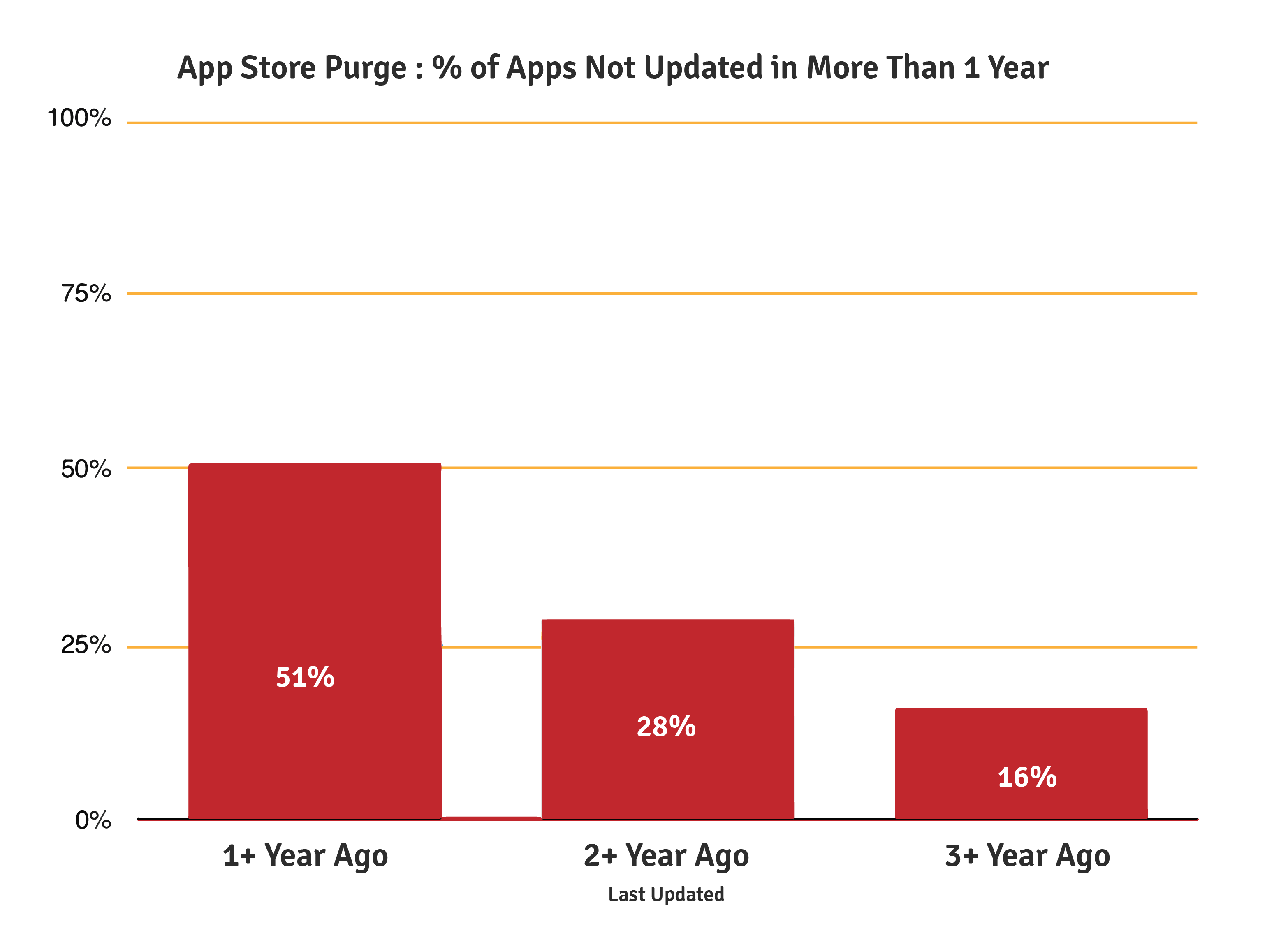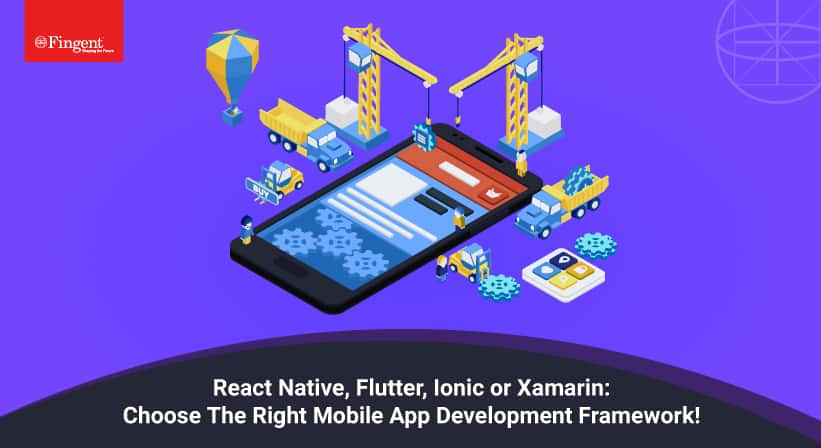Regular App Maintenance: Here’s Why You Should Plan For One
You are planning to build an app for your business. You zero in on the app features, then develop it and finally release your app to the respective stores. You actively monitor your app’s usage and analytics. Your users are happy and they actively use your app. After a while, you notice a dip in the curve.
Your app starts falling behind in-store listings, garners poor user reviews, becomes frequently prone to errors. Then one day you get an email from the respective app store that your app might be removed if it does not meet the latest requirements of the app store.
So, what went down?
Well, did you ever take the effort to continue maintaining the app? Delivering updates on a timely basis so that your app stays compatible with current requirements and is well ahead in terms of features, functionality, security, and performance is a vital part of app development.
You might have built the perfect app, but how long can it remain active and not pass out as obsolete without proper maintenance?
As an enterprise app development company, our experience has shown us that creating and deploying an app is sensible and profitable in the end only if you tie it up with a regular update cycle. We put equal stress on pairing a solid maintenance contract having timely release cycles into every mobile app that we built and always insist on our clients on the importance of having one.
Ongoing maintenance remains indispensable in app development
In 2016, Apple made a relentless push clear its App Store for all outdated apps, delisting 50,000 apps according to a report by Sensor Tower. It further revealed that 51 percent of apps haven’t received any updates in a year.

Source: Sensor Tower
Earlier, you build an app and launch it. You only need to focus on developing the app in the best possible way. However, things have changed. Ongoing maintenance is so important now that almost 80 percent of developers release some form of updates to their apps every month.
Performing maintenance constantly, reinvent your app’s functionality and fix any bugs or other latent issues. It’s unlike the build and deploy once approach that was employed traditionally.
To keep up with the ever-changing user and app store requirements, you should not only build, deploy and optimize your app for the store listing but also improvise it by regularly issuing new updates. Like a newly constructed house that requires additional investment and efforts at maintenance like cleaning, painting and other upgrades, your apps should similarly go through a regular upkeep cycle to keep it active.
Besides, setting up a maintenance plan is so important for your business as several external variables are prone to changes that can affect your app’s functioning. These include:
- Mobile hardware: As handset manufacturers keep releasing newer models each year, mobile apps can become incompatible with the latest mobile hardware, causing them to fail. With a maintenance plan, you can continuously deliver new updates that extend support to all the latest mobile hardware specifications.
- OS versions: Android and iOS are evolving with new version upgrades every year and your mobile app should take into account these changes to extend support and compatibility with upgraded OS versions.
- User Interface: Material Design, Google’s visual design language, marks the change from Skeuomorphic principles towards a fresh approach to user interface design. Keeping up with the current user’s preferences meant adopting newer UI/UX design standards for the app interfaces offering immersive digital experiences.
- Security: With data breaches now commonplace, you should integrate all recent security protocols into your apps to uphold privacy and security.
- Programming languages: Programming languages use to build apps also undergo changes and your apps should stay updated considering these variations.
- Software libraries: Third-party software libraries and dependencies used in apps go through frequent changes, which affects your app’s functioning and cause it to malfunction if they are not upgraded.
- Licensing: Apps that you build has to be tied down to licensing agreements and certifications. These agreements are a limited time offer and therefore need to be renewed periodically to keep the app intact and functional throughout its lifetime.
- Hosting infrastructure: The platform where your app’s database and backend are hosted such as AWS can also be subject to changes throughout the year.
Signing maintenance contracts save your app from getting outdated
Post completion, your vendor may ask about maintenance contracts for your app. Most businesses decline to sign up for a maintenance contract, because to them, the idea of paying extra amount for an already launched app sounds absurd and unconvincing. However, considering the necessity of app maintenance, it is mandatory that a maintenance contract is bought in and formulated alongside the actual development.
Once you sign up for a maintenance contract, you get the dual advantage of both support and regular updates. Every issue that crops up will be dealt with immediately by the development team once you enroll for a maintenance contract, thereby significantly reducing your app’s downtime. Besides, when platform changes occur, such as new OS versions or hardware, your app development partner can review them in advance and plan all future updates accordingly.
Understanding maintenance costs
Maintaining your app continually comes with its costs, which can vary depending on the scope and functionality of the app. Clutch, in one of their surveys, outlines that post-launch maintenance can cost anywhere between $5000 – $10,000, a year after launching the app, which varies based on the vendor opted.
However, maintenance costs follow the standard industry norm, which is 20 percent to that of the initial development cost. For instance, if your app costs about $10,000 to develop then maintenance would run around to $2000 a year. This is subject to vary as it takes into account several other factors like the type of app – native or hybrid, additional features – (push notifications, payment gateway), backend hosting platform, use of third-party analytics tools, etc.
So, what real benefits does your business gain by signing up for a maintenance contract with an app developer?
- Lower Uninstall Rates – AppsFlyer in their newest report shows that the global uninstall rates for apps in a month account for about 28 percent. Timely maintenance can come to the rescue by promptly applying all the first time fixes to the app, which retain your active users lowering the chances of uninstalling.
- Sustained User Loyalty – Constant maintenance does finally pay off via sustained user loyalty across the app’s entire lifetime, which is one crucial ingredient that defines your app’s success in the long run.
- High Rankings in Store Listings – Keeping up with ongoing maintenance ensures that your app adheres to quality guidelines and is constantly optimized based on updates and user feedback for properly ranking in the store listings.
- Adaptation Centered on User Feedback – Recurrent maintenance helps monitor usage patterns to retrieve business insights and create individual user funnels. Using in-app analytics tools, developers can analyze the app’s functioning and resolve any crashes or bugs for flawless user experience and improved retention.
- Increased ROI – With a solid maintenance plan in place, your app can achieve long term benefits for your business by reaping higher financial gains, leading to increased ROI. Besides, you can decrease the overall costs by monitoring the app post-launch and removing redundant features that most users ignore or skip by.
Conceive a maintenance plan by collaborating with your app development partner
Finding a reliable app developer with expertise in building enterprise applications helps kick start your app’s development and maintenance cycle. Once signed up, the development team assesses your app’s performance after launch. Taking incoming feedback from users and identifying the potential issues mentioned, the team adopts an end-user development approach to detect bugs and other performance issues beforehand and proactively fix them.
You can get the best in class maintenance support for your mobile app with our application development services. Talk to our consultants today and see how Fingent top custom software development company, helps you conceive the right maintenance strategy for your app that yields new revenue streams and enhance your business outcomes.
Stay up to date on what's new

Recommended Posts

21 Jul 2023 B2B
How Biometric APIs Will Replace Passwords on Mobile Apps
Technology successively progresses all around us; from the simplest basic Google searches to the working of aircraft, technology has indented its value in everyday life. Biometric APIs are not a……

14 Jun 2023 B2B
How Artificial Intelligence Can Help Create Transforming Mobile Apps!
Today we live in a world where machines possess an extraordinary ability to learn, reason, and make decisions, much like the human mind. This remarkable realm of technology known as……

22 Nov 2022 B2B
React Native, Flutter, Ionic, Xamarin – A Comparison Between The Top Mobile App Development Frameworks
Frameworks are the backbone of mobile app development. They are essential to building dependable apps quickly. When choosing a framework, you can choose between native or cross-platform applications. Though both……

21 Nov 2022 B2B
Why App Modernization Projects Fail – The Secret To A Successful App Modernization Project Journey!
Modernization is a desire to stay relevant and grow. App modernization does just that for businesses. It enables them to stay relevant and grow. In line with that, organizations worldwide……
Featured Blogs
Stay up to date on
what's new






















































